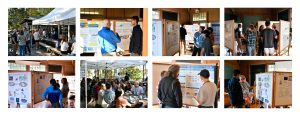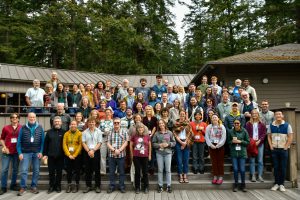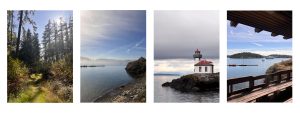Conversations in Climate Progress and Interventions: The 2024 PCC Summer Institute
The 2024 Summer Institute was held at UW’s Friday Harbor Laboratories, nestled on San Juan Island in the northern region of Puget Sound. This year’s event spanned three days, September 9th through the 11th. The theme was the controversial topic of geoengineering, which explores technologies with the potential to alter Earth’s climate system to offset the impacts of anthropogenic climate change. The organizers were Tom Ackerman, Cecilia Bitz, Stephen Gardiner, and Rob Wood, with excellent assistance from Miriam Bertram and Julia Pelger.
Geoengineering raises major challenges for science, ethics, and governance. Presentations in each session of the Summer Institute drew from at least two of these areas. This allowed experts from these fields and the participants to engage in a fruitful cross-disciplinary dialogue about how these challenges intersect and what the various disciplines involved can learn from each other.
Preparatory paper discussions were held on Solar Radiation Management (SRM) and ethics in the weeks before the Summer Institute. On Monday, September 9th, we welcomed and welcomed back our PCC community and guests to Friday Harbor Laboratories for our 22nd annual PCC Summer Institute.
The events began with an afternoon welcome session where attendees enjoyed a poster session accompanied by appetizers and drinks on the patio. Poster topics included Marine Cloud Brightening (MCB), the mental health impacts of wildfire, global deep and abyssal warming trends, lifetimes and feedbacks in the coupled chemistry-climate model system, re-thinking climate, and more.

After a break for dinner, the evening session jumped into the current research frontiers of geoengineering. The session began with a warm welcome and a Summer Institute overview from PCC Director, Becky Alexander. The session, chaired by Cecilia Bitz, then dove into the current research frontiers of geoengineering. Talks were given by Tom Ackerman: “Spatial and temporal time scales from testing to deployment”, Stephen Gardiner: “Intergenerational Justice”, and Phil Rasch: “The use and abuse of GCMs for Climate Intervention research: MCB as an exemplar”. The session concluded with a panel and discussion aided by virtual question submission and polling.
The Tuesday morning session honed in on MCB, discussing the science and ethics of its research, field tests, deployments, and governance. MCB is a particular approach to SRM geoengineering that hinges on the brightening of low marine clouds to increase their reflectivity and, thereby, decrease solar radiation absorption and global warming. Small particles produced by salt spray injection into the marine boundary layer can produce brighter clouds when entrained into marine clouds. The feasibility and complications of large-scale MCB are still being discussed, along with the ethics of intentionally altering the global climate system.
The session, chaired by Becky Alexander, traversed a discussion of ethical principles for scientific research on MCB, MCB research and how it might be conducted, and the interplay with social and ethical criticism. Speakers included Byron Williston: “Ethics and Governance Principles for SRM”, Rob Wood and Sarah Doherty: “What research is needed to assess marine cloud brightening?”, Michael Diamond: “Exit ramps for a dedicated research program into marine cloud brightening”, and Arthur Obst: “Ethics, MCB, and Outdoor Research”. The session coffee break included time for a group photo and then concluded with a speaker panel for further questions and cross-discussion. This session provided a paradigm of how experts from differing perspectives on geoengineering can illuminate the issues and help clarify the needs for ongoing research.

With Tuesday afternoon free, many took to exploring the island. San Juan Island features the small town of Friday Harbor with its shops and restaurants, Lime Kiln State Park (a favorite spot for orca viewing), many lighthouses, and various natural spaces with beaches, hiking trails, and endless views. Participants shared that they biked around the island, rowed to town, hiked, got a bite to eat, visited different natural areas, and a handful of people were lucky enough to spot an orca from the docks at the labs.Tuesday concluded with an evening session on “Regional Interventions: Questions of Science and Governance”. This section provided a perspective on what is happening in different global regions, including the Arctic, and how geoengineering governance is taking shape. The session was chaired by Molly Wieringa who facilitated introductions, the panel, and questions. Presentations and talks included Sikina Jinnah: “SRM Governance Milestones”, Pornampai ‘Ping Ping’ Narenpitak: “SRM Research in Thailand: A Case from the Global South”, and Cecilia Bitz: “Can Geoengineering Offset Arctic Climate Change?” with a concluding panel. This session emphasized the complications of even small regional experiments due to the complexities in the climate system and international relations.

The final session was held on Wednesday morning. This session was focused on Carbon Dioxide Removal (CDR), the extraction of carbon from the atmosphere and oceans (MCDR) to offset emissions. CDR must be a major instrument in reaching net zero emissions as certain emitters, such as agriculture, are very challenging to reduce to effectively zero. While the general idea of CDR is much less controversial than SRM, there are controversial answers to specific questions about which possible techniques should be used and/or can be scaled up for use, how these techniques impact the carbon cycle, and how they might be included as “carbon credits” for purchase.
This session, chaired by Michael Diamond, was titled “Carbon Removal: Questions of Ethics and Effectiveness”. Speakers included Britta Clark: “Negative Emissions and Excuses”, Claire Zarakas: “Comparing carbon removal approaches that act over different timescales”, and Brendan Carter: “Marine Carbon Dioxide Removal Research; Example Research Exploring Local and Global Impacts of Ocean Alkalinity Enhancement (OAE)”.
The concluding session was chaired by Tom Ackerman. It began with a summary of themes from PCC Summer Institute 2024 from Stephen Gardiner. This was followed by a panel on “The (uncertain) future of geoengineering” featuring Britta Clark, Jon Milgrim, Ping-Ping Narenpitak, Julia Pelger, and Molly Wieringa. It is difficult to capture the overall sentiments of the panel responses, but it was clear that the future of geoengineering is uncertain due to unsolved issues in the science, the ethics, and the governance.
Closing remarks were provided by Director Becky Alexander and then most participants departed the Lab to catch the ferry back to the mainland. Becky, followed up her closing remarks on the ferry ride where she collected topic ideas for next year’s summer institute.
The Summer Institute would not be possible without speakers, organizers, participants, and the lovely FHL staff. We are very grateful to all who gave their time and talents to make this year’s event successful. A special thanks to William Calvin and Katherine Graubard for generously supporting the 2024 PCC Summer Institute.
The full agenda, speaker information, and titles can be found here.
Written by Elise Herzfeld, PCC Undergraduate Assistant